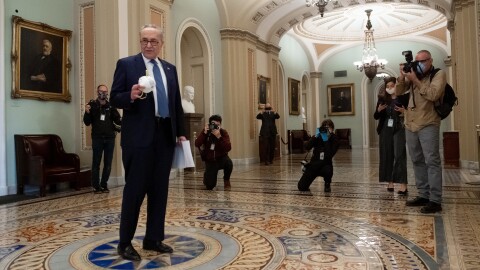Congress is preparing to allocate more funding to the Paycheck Protection Program—a forgivable loan initiative meant to help employers keep workers on the payroll during the pandemic.
The deal announced Tuesday includes another $320 billion for the popular program, which quickly exhausted its $350 billion appropriation. It also drew criticism along for allowing well-established companies like chain restaurants to access funding.
Sen. Rob Portman (R-Ohio) understands that frustration, but wants the program to judge applications based on economic impact rather than a business’s size.
“My concern is it ought to be tightened down and it ought to be as to what the revenue loss has been, something more specific,” Portman says. “Because we want to target this program to those businesses that are most affected.”
In some circumstances, that might mean including chain employers. To Portman, the key is how coronavirus is affecting the company’s balance sheet.
“So let’s say you’re a big franchisee, and you have a lot of franchises, so you’re over 500 employees,” Portman says. “If you were shut down because you couldn’t do your work, you would want to have them access to PPP, but if you were able to stay in business and do a pretty good business on takeout, you’d be in a different situation.”
Ohio companies accounted for just over $14 billion worth of the program’s initial funding.
Portman notes that federal assistance has been slower than he’d like because Congress has been reticent to allow lawmakers to participate remotely.
“I think it’s long past time for Congress to find a way to do what millions of Americans are doing, which is to work but work remotely—on hearings on debate on amendments and on vote," he says.
With limited in-person participation, Portman says, Congerssional leaders have had to rely on passing legislation by unanimous consent. He notes getting to 60 votes is a lot easier than getting to 100.
Separating himself somewhat from President Trump, Portman echoed Gov. Mike DeWine’s insistence that more diagnostic testing is needed before the state can begin returning to normal. The new deal includes $25 billion to support additional testing around the country.
“Widespread testing to develop and track the necessary measurements, the metrics that shows the scope of this pandemic, will be necessary to make people feel comfortable that it’s time to go back to work, time to reopen our schools," Portman said.
The Trump administration has insisted there are plenty of tests available. Governors from both sides of the aisle have disputed that claim.
Portman also echoed concerns raised by Ohio mayors last week, acknowledging that Congress will have to find ways to provide direct funding to local and state governments struggling amid the slowdown. Many cities in Ohio are in a particularly precarious situation because of their reliance on income tax receipts.







